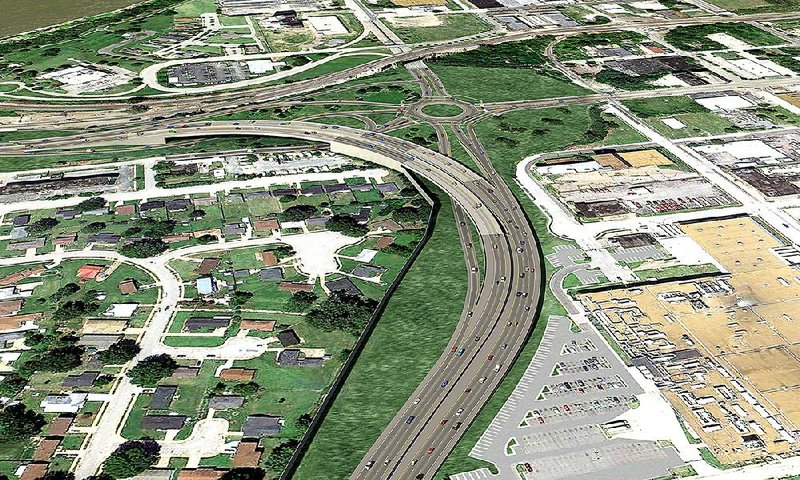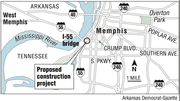Plans to temporarily close the Interstate 55 bridge over the Mississippi River between West Memphis and Memphis are drawing concern and outright opposition from the Arkansas side of the river.
The nine-month closure of the bridge, one of two crossings that Arkansas and Tennessee share between the two cities, is scheduled to take place in 2017 because Tennessee Department of Transportation officials say it is the only option to accommodate reconstruction of a major interchange on the Memphis end of the bridge near a historic neighborhood called French Fort.
"There is simply not enough space to rebuild this interchange, preserve the French Fort neighborhood, and maintain traffic across the I-55 bridge," Tennessee's top highway official, John Schroer, said in announcing the bridge closure on May 27.
But Arkansas residents say the decision to close what is locally known as the "Old Bridge" was made without factoring in the economic impact of closing the bridge or allowing them to be a part of the decision.
"It could kill our community," said Jessica Williams, a 24-year-old West Memphis resident who commutes to her job in Memphis.
The Interstate 40 bridge isn't big enough to handle the traffic of both bridges, she and others say.
"The bridge in peak hours will become impassable to commuters and emergency personnel alike," Williams said. "Even with just construction, my commute [now] is an hour or more every day."
"Also, we can say goodbye to the shared tourism. I've met many tourists in Memphis who have popped into Arkansas to enjoy some of the nature parks at Jonesboro and Crowley's Ridge. No one will take the time when it will take two hours just to go over the bridge."
She also said many downtown Memphis residents cross the bridge to shop at West Memphis retail and grocery stores, such as Wal-Mart and Kroger, for convenience.
"This helps our local economy," Williams said. "They will no longer do that with only one bridge to cross."
As of Friday, more than 2,700 people signed an online petition, "Keep the Old Bridge Open," which claims the closure will "devastate local economies throughout eastern Arkansas and ... cripple emergency services in the event of an accident or natural disaster."
State Sen. Keith Ingram, D-West Memphis, started the petition.
He now says Tennessee highway officials, in not taking into account the impact of the bridge closure, aren't in compliance with federal law requiring "full consideration" of a contiguous state if any project has the potential to affect traffic volume and the highway system of the contiguous state.
"Legal issues aside, the consequences of the closure of the bridge for nine months are such that, even if such laws did not exist, common sense and sound public policy would dictate a reconsideration of this matter, with a heavy presumption against closure of the bridge for a lengthy period of time," Ingram said in a letter to Tennessee highway officials earlier this month.
The Arkansas State Chamber of Commerce has endorsed Ingram's petition and has encouraged its membership to sign it.
"The I-55 bridge is one of the most important corridors for economic activity not only for West Memphis but for the state of Arkansas," Randy Zook, the chamber's president and chief executive officer, said in a statement. "Access to that crossing is vital to many sectors in our economy from employee travel to work, shipment or delivery of goods for all sorts of retailers and manufacturers. That's not to mention tourists and the rest of the entire economy."
He would like Tennessee highway officials to look at another option short of closing the bridge.
"Modernizing the interchange is a worthy project and needs to be accomplished, but in a manner that will minimize the disruption caused by the closure," Zook said. "Interstate cooperation will be vital."
The I-55 bridge is a key freight corridor. More than a quarter of the nearly 40,000 vehicles that ply the bridge daily are trucks, according to Tennessee highway officials.
Still, the Arkansas Trucking Association wants more information before it weighs in.
"We are currently working with my counterpart at the Tennessee Trucking Association, utilizing his contacts within TDOT to ensure that the freight implications of any plan are fully taken into consideration," said Shannon Newton, the Arkansas organization president.
"We are monitoring the plan. However, until we have more information from TDOT on their knowledge and consideration of the freight impact, we are refraining from taking any position."
No one disagrees, though, that the interchange at I-55 and E.H. Crump Boulevard in Memphis needs improvement. It dates to 1964 when fewer than 15,000 vehicles a day used the interchange, which is a clover-leaf design popular at the time but considered substandard now.
About 60,000 vehicles use the interchange daily now. Tennessee highway officials predict the interchange will handle almost 85,000 vehicles daily by 2035.
And the interchange has a higher traffic accident rate than the rest of the state because the design essentially requires higher-speed interstate traffic to mix with non-interstate traffic, which is traveling at slower speeds.
Construction is currently planned to begin in the spring of 2016, and will require the full closure of the Memphis-Arkansas Bridge for a period of nine months. The full closure of the bridge is not expected to occur until the spring of 2017.
"This design includes large structural elements that are very complex in nature, and create unique challenges during the construction phase," according to a Tennessee Transportation Department statement.
Tennessee highway officials have said they will do everything possible to minimize the impact of the project on residents, business owners, commuters and emergency services.
To that end, they acknowledge Arkansas opposition has been loud. "We have heard it," said Jane Jones, project development director for the Tennessee Department of Transportation region that includes the Memphis area.
But that doesn't necessarily mean Tennessee highway officials will leave the bridge open, Jones said.
"The closure is still on the table," she said.
But Jones said she and other Tennessee highway officials are making efforts in recent days to reach out to the Arkansas side of the Mississippi River to assess what they can do to further mitigate the effects of the bridge closure.
Those include meeting with emergency officials on the west side of the river to "flesh out" an emergency plan they will have in place for when the bridge closes.
They also will hold or already have held meetings with Arkansas, Tennessee and Mississippi trucking executives as well as major freight users in the region, including FedEx, which is based in Memphis, Jones said.
She also said her agency is seeing what it could do to improve safety and capacity on some of the other parts of the interstate system as well as local roads in advance of the project.
"We are looking at all the mitigation we can do on the Arkansas side and on the Memphis side," Jones said.
Metro on 07/20/2015

